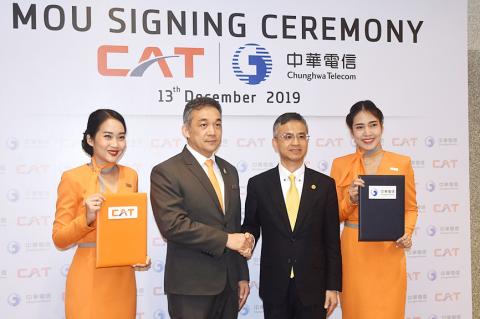Chunghwa Telecom Co (CHT, 中華電信), the nation’s biggest telecom operator, yesterday said that it has inked a memorandum of understanding with CAT Telecom PCL to develop smart city services in Thailand as part of renewed efforts to explore new revenue sources in emerging Southeast Asian markets.
Chunghwa Telecom’s latest move came after it tapped into the Vietnamese market 12 years ago via a joint venture with Viettel Group to establish Viettel-CHT Co, providing telecom technology and helping the state-run company build a data center.
“Chunghwa Telecom aims to provide information and communications technology solutions to our partners in Southeast Asian countries by integrating our software capabilities with hardware,” company president Harrison Kuo (郭水義) said in a statement.

Photo: CNA
“With the signing of the memorandum, the companies will kick-start a series of new joint projects, further deepening the partnership,” Kuo said.
Chunghwa Telecom is to assist CAT Telecom in offering smart city-related applications, including intelligent video surveillance systems, automated license plate recognition and smart street lamps, as well as in building a data center, the statement said.
The company expects to develop at least three to five sizable projects within a year to provide niche applications, it said.
It is also considering forming a joint venture with CAT Telecom to propel the partnership to the next level, the Central Agency News (CNA) reported on Thursday.
CAT Telecom, 100 percent owned by the Thai Ministry of Finance, last reported revenue of 76 billion baht (US$2.52 billion).
Chunghwa Telecom in 2017 invested NT$10 million (US$329,848 at the current exchange rate) to establish fully owned subsidiary Chunghwa Telecom (Thailand) Co in Bangkok. Earlier this year, it invested an additional NT$30 million in the unit, which provides virtual Internet services and value-added cloud-enabled services.
Apart from Thailand, Chunghwa Telecom aims to make inroads in Indonesia later this year, aiming to duplicate its success in Vietnam, CNA said.
Chunghwa Telecom posted revenue of NT$17.55 billion for last month, down 3.8 percent from NT$18.24 billion a year earlier.
The telecoms attributed the decline to falling mobile services revenue due to intensifying competition and lower revenue from fixed-line voice calls.
Net profit last month contracted 2.9 percent year-on-year from NT$2.91 billion to NT$2.82 billion, while earnings per share slid from NT$0.37 to NT$0.36, company data showed.
In the first 11 months of this year, revenue fell 4.4 percent year-on-year to NT$187.38 billion, the data showed, further evidence that the telecoms is likely to miss its revenue target of between NT$221 billion and NT$223 billion for the whole year.
Net profit fell 7.1 percent annually from NT$32.66 billion to NT$30.34 billion in the period, while earnings per share slid from NT$4.21 to NT$3.91, the data showed.

Among the rows of vibrators, rubber torsos and leather harnesses at a Chinese sex toys exhibition in Shanghai this weekend, the beginnings of an artificial intelligence (AI)-driven shift in the industry quietly pulsed. China manufactures about 70 percent of the world’s sex toys, most of it the “hardware” on display at the fair — whether that be technicolor tentacled dildos or hyper-realistic personalized silicone dolls. Yet smart toys have been rising in popularity for some time. Many major European and US brands already offer tech-enhanced products that can enable long-distance love, monitor well-being and even bring people one step closer to

Malaysia’s leader yesterday announced plans to build a massive semiconductor design park, aiming to boost the Southeast Asian nation’s role in the global chip industry. A prominent player in the semiconductor industry for decades, Malaysia accounts for an estimated 13 percent of global back-end manufacturing, according to German tech giant Bosch. Now it wants to go beyond production and emerge as a chip design powerhouse too, Malaysian Prime Minister Anwar Ibrahim said. “I am pleased to announce the largest IC (integrated circuit) Design Park in Southeast Asia, that will house world-class anchor tenants and collaborate with global companies such as Arm [Holdings PLC],”

Thousands of parents in Singapore are furious after a Cordlife Group Ltd (康盛人生集團), a major operator of cord blood banks in Asia, irreparably damaged their children’s samples through improper handling, with some now pursuing legal action. The ongoing case, one of the worst to hit the largely untested industry, has renewed concerns over companies marketing themselves to anxious parents with mostly unproven assurances. This has implications across the region, given Cordlife’s operations in Hong Kong, Macau, Indonesia, the Philippines and India. The parents paid for years to have their infants’ cord blood stored, with the understanding that the stem cells they contained

Sales in the retail, and food and beverage sectors last month continued to rise, increasing 0.7 percent and 13.6 percent respectively from a year earlier, setting record highs for the month of March, the Ministry of Economic Affairs said yesterday. Sales in the wholesale sector also grew last month by 4.6 annually, mainly due to the business opportunities for emerging applications related to artificial intelligence (AI) and high-performance computing technologies, the ministry said in a report. The ministry forecast that retail, and food and beverage sales this month would retain their growth momentum as the former would benefit from Tomb Sweeping Day